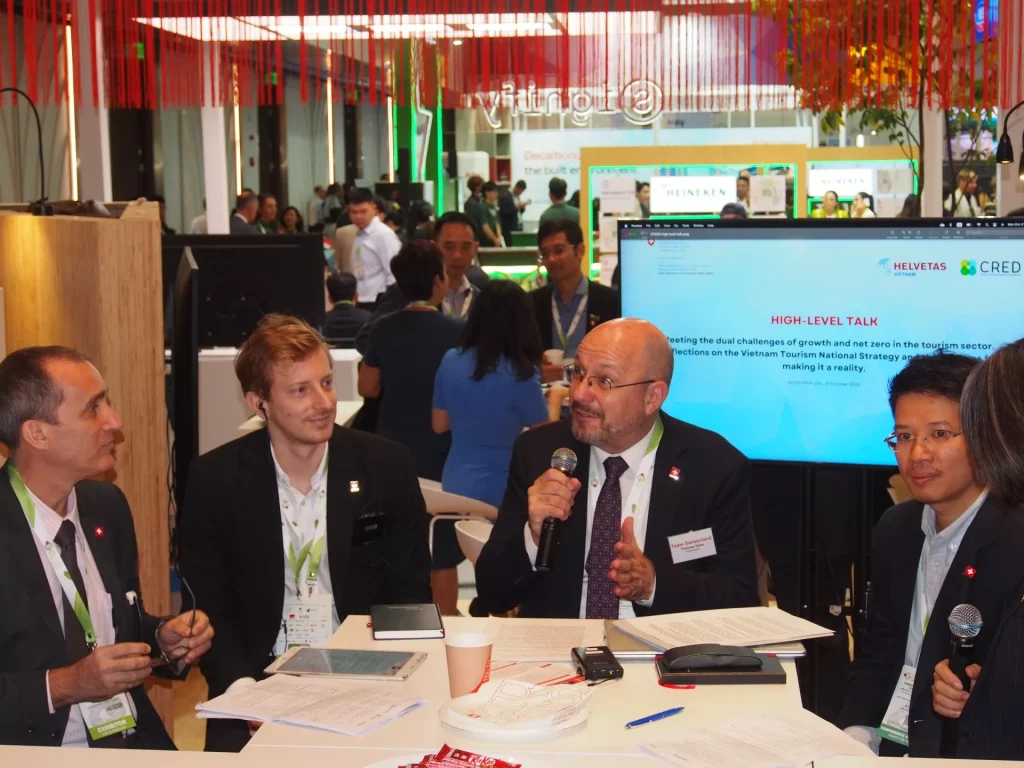Ho Chi Minh City – The ST4SD project, along with three other projects funded by the Swiss government, showcased their outstanding contributions to building a more sustainable and inclusive economy in Vietnam at the Green Economy Forum and Exhibition (GEFE) held from October 21-23, 2024, in Ho Chi Minh City.
Vietnam aims to become a high-income nation by 2050 and has committed to achieving net-zero emissions by 2050. According to the Vietnam’s tourism development strategy until 2030, the tourism sector is poised to become a key economic industry, contributing to economic and social growth while ensuring sustainable development. However, Vietnam’s tourism industry faces a dual challenge of growth and achieving the net-zero emissions target.

Over the three days of the event, the ST4SD project organized a series of activities to seek solutions to these challenges in Vietnam, with participation from distinguished guests, including Swiss Ambassador to Vietnam Thomas Gass, Deputy Head of Cooperation Andri Meier, representatives from the Private Sector Development Research Committee (Committee IV) and leaders from the Departments of Culture, Sports, and Tourism (DoCST) of Ha Giang, Quang Nam, and Dong Thap provinces.
In the high-level discussion held at the Swiss Pavilion on the sidelines of GEFE 2024, distinguished guests and the ST4SD project team discussed strategies for reducing carbon emissions in the tourism sector, the role of policy and regulatory frameworks, and the importance of public-private partnerships and innovation.
Sustainable tourism development in Switzerland and lessons for Vietnam
Ambassador Thomas Gass shared Switzerland’s policy framework and sustainable tourism practices, highlighting lessons that Vietnam could learn from this model. According to the Ambassador, Switzerland’s natural landscapes and cultural heritage are central to its tourism appeal. Therefore, protecting these resources is key to promoting both the environment and the tourism sector. “Sustainability is one of the key objectives in our policy framework. We want to ensure that the development of the tourism sector not only achieves high growth but also preserves these natural and cultural heritage,” the Ambassador said.

In Switzerland, the “Swisstainable” sustainability initiative was launched in 2021. Tourism destinations, hotels, and restaurants engaging in sustainable development are recognized with the “Swisstainable” label, helping tourists easily find more sustainable products and services.
The Ambassador noted that Vietnam is a country with many stunning landscapes and rich cultural heritage. If Vietnam can preserve and develop these valuable assets, the tourism sector will certainly benefit. To develop sustainable tourism while ensuring economic growth, Vietnam should promote public-private partnerships in initiatives aimed at building climate-resilient infrastructure and eco-tourism, advance green tourism standards, implement sustainable tourism certifications, and improve the quality of human resources and tourism products.
Dr. Sabine Mueller, a lecturer at the Lucerne University of Applied Sciences and Arts (HSLU) and a consultant for the ST4SD project, mentioned that Switzerland is gradually shifting from a quantitative approach to a qualitative one in calculating carbon emissions, measuring effectiveness, and setting sustainability standards specifically for the tourism industry. She suggested the need for a carbon trading mechanism to neutralize emissions and create a funding source for local projects and community development.
Balancing economic growth and sustainable development

Dr. Bùi Thanh Minh, Deputy Director of the Committee IV, shared that the Vietnamese government has acted quickly to meet the net-zero emissions target by 2050, as committed at the 26th UN Climate Change Conference of the Parties (COP26). However, Vietnam still lacks a clear roadmap, sufficient information, and resources. In the green transition report submitted to the Prime Minister, Committee IV recommended several solutions to overcome these challenges, such as green credit programs at banks to enable businesses to access financing, establishing green building standards and criteria, and creating mechanisms to help businesses access international green certifications.
“Achieving net-zero requires action at two levels: the government level and the business level. The government needs to have policies to support businesses in the green transition and encourage public-private partnerships to provide financial support. When businesses are aware of available resources, measurement indicators for building green buildings, green tours, and the benefits of the green transition, they will adopt the mindset of transformation,” Dr. Minh said.

As the first province in Vietnam to introduce a provincial set of green tourism criteria, Quang Nam is gradually implementing its green tourism development strategy, with the involvement of local authorities, the tourism community, and residents. According to Mr. Van Ba Son, Deputy Director of Quang Nam provincial DoCST, local businesses face difficulties in transitioning towards sustainability due to the predominance of small businesses focused mainly on commercial activities. The absence of a clear roadmap and lack of uniform mechanisms to encourage businesses also discourage the shift.
However, many businesses in Quang Nam have proactively embraced sustainable practices and participated in the province’s and international certification programs. Mr. Son praised the commitment and efforts of the private sector, noting that several businesses are ready to take the leap. For example, The Field Hoi An restaurant is the first in Vietnam to be awarded low-carbon certification.
“Quang Nam has a green tourism development mechanism, but there is still a need for a nationwide, inclusive mechanism to help businesses make the transition. Besides the mechanisms, I believe it is necessary to analyze the roles of the public and private sectors and clarify the benefits for businesses undertaking the green transition,” Mr. Sơn emphasized.

Meanwhile, Dong Thap province has also taken steps to promote sustainable development, such as circular production initiatives, the conservation of the red-headed crane, reforestation projects, and planning for the Gao Giong eco-tourism area. Mr. Le Nhut Lil, a specialist of the Tourism Management Office at the Dong Thap provincial DoCST, noted that the biggest challenge is raising awareness among the local people and tourism practitioners, as tourism businesses in the province are small and poorly connected. He suggested that the Sa Dec eco-tourism village could be developed as a net-zero destination, and this model could later be replicated across the province.
In Ha Giang province, Mr. Nguyen Hong Hai, Director of the Ha Giang provincial DoCST, shared that the province has planned a roadmap to develop 39 villages to become sustainable community-based tourism destinations. Thanks to support from the Swiss government, Ha Giang has developed the Nam Dam community tourism village (Quan Ba district) and community-based tourism models in Hoang Su Phi district. Mr. Hai also sought technical assistance to protect the environment in these community-based tourism villages, including wastewater and waste treatment, upgrading internal roads, and developing a climate change adaptation strategy for the tourism sector.

Summing up the discussion, Mr. Do Quang Huy, Senior Programme Officer of the Swiss State Secretariat for Economic Affairs (SECO), highlighted four key points. First, there needs to be a balance between economic growth and sustainable development. The lesson from Switzerland is that eco-tourism is not an option but a strategy. Second, Vietnam lacks and needs to build a clear roadmap for each sector to reduce emissions. Third, Vietnam needs an action-oriented approach at the national, provincial, and business levels. For example, Quang Nam province addresses tourism overcrowding and heritage preservation. Ha Giang province focuses on community-based tourism linked to climate change adaptation, and Dong Thap province aims to develop biodiversity conservation tourism. In addition to national policies, provinces can proactively build their own local mechanisms and policies. Fourth, technical support from partners is necessary. Switzerland is committed to supporting Vietnam throughout the process and will continue to assist in implementing policies through public-private dialogue, developing sustainable tourism destinations and products, to help Vietnam promote sustainable tourism, like Switzerland and other countries.
The discussion session aimed to promote Switzerland’s technical support for Vietnam in sustainable tourism development through the ST4SD project and emphasized solutions to help Vietnam achieve its net-zero target in the tourism sector while ensuring growth.